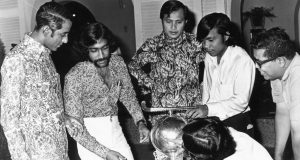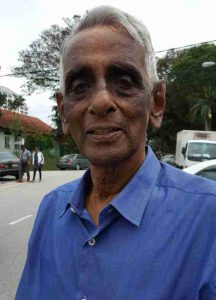 By
By
G.Vijayanathan: Hockey had always been my number one sport but after playing the game for a continuous period of 32 years for the Tamilians’ Physical Culture Association (T.P.C.A.), that I realised I wasn’t going to get anywhere, and decided to take up umpiring.
My initial registration as an umpire was as a Grade Three umpire with the Malaysian Hockey Federation (M.H.F.) Umpire’s Board on March 15, 1964. My first major tournament was the Government Services Hockey Competition which was held in Kuala Lumpur from July 17 -19, 1964. Although it was my first major tournament, I had the distinction of umpiring the final alongside S. Kathiravale.
My rise in international umpiring:
I had the opportunity to umpire at the International Hockey Tournament in Ahmedabad in 1962 where I had accompanied the Malaysian team as the Secretary. They were short of umpires. Unfortunately, our manager Dr. Aziz Durairatnam did not give his approval. He was not happy with the way Mr. P. Nagarvallah (Chief Organiser of the Tournament) treated the Malaysian team.
All the umpires who officiated at the tournament were confirmed as F.I.H. Class one International umpires by Mr. Rene Frank, the President of F.I.H. who was present at the tournament. What a great honour it would have been for me and Malaya (then)
The Asian Games, Bangkok, 1966:
Due to the uncertainty of Malaysia’s participation and the insistency of the host that only international class One umpires would be invited to officiate, the umpires’ board could not bid to send an umpire with the national team.
However, during the M.H.F. executive meeting the matter was brought up and the president (Tun Abdul Razak) suggested that as I was accompanying the Malaysian contingent as assistant manager, I should be appointed as the Malaysian official umpire to take my chances there. As luck would have it, the organisers were short of the required number and I had the opportunity of umpiring some matches, thanks to the foresight of our former Prime Minister and President of MHF, Tun Abdul Razak
1970 Asian Games, Bangkok, Thailand:
Lee Cheng Poh and I officiated at the Games. Although it was the first time I was to officiate at the Asian Games as an International Class One umpire, I had the honour and privilege of umpiring the final between India and Pakistan together with Ramalingam of Singapore.
The normal time finished with an exhibition of club standard hockey and the game went into extra time. There was no score in the first half of extra time. In the second period of extra time, India was awarded a short corner and there was a strong feeling that India’s chance had come. However, the hit-out was penalised for sticks and soon after Rashid scored the winning goal for Pakistan.
Jimmy Nagarwala, a top Indian hockey official paid glowing tribute to my umpiring in the final when he said, “In my 20 years of watching Pakistan and India play, I have not seen such a well contested, clean game.”
Revised List of Grade One International Umpires:
The International Hockey Federation (FIH) revised the list of Grade One International umpires at their meeting in Brussels in March 1971. Only Grade One umpires were permitted to officiate at the Olympic Games and those for Munich were selected at the FIH meeting held in October. Besides Pakistan which had 13, the other Asian countries like India had eight, Japan (4), Korea (1), Singapore (1) and I was the sole Malaysian Grade One Umpire.
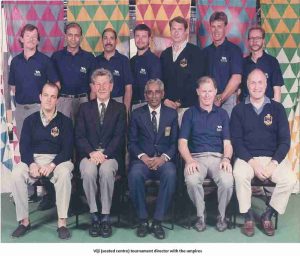
Munich Olympic Games – (August 27 to September 9, 1972
I was appointed by the F.I.H. to officiate as an umpire at the Munich Olympic Games. Twenty-eight umpires were selected for the tournament. The Asian umpires came from Pakistan (3), India (3), Korea (l), Singapore (l), Japan (1) and I represented Malaysia.
A bitter experience: – On September 8, 1972, I umpired the semi-final between West Germany and Netherlands. West Germany beat Netherlands 3 – 0 to qualify for the final against Pakistan who beat India 2 – 0 in the second semi-final. At least 15,000 spectators witnessed the semi-finals, 11,000 in the stadium and another 4,000 on hills nearby.
At the end of the day, the technical officials for the final between Pakistan and Germany were announced. I was thrilled to be nominated as one of the umpires together with Servetto Horacio from Argentina. Unfortunately, my elation was short-lived.
German officials had approached F.I.H. President, Rene Frank and asked him to replace me. They claimed that I was an Asian and therefore should not umpire as an Asian team was involved. I was summoned by the President who told me about the objection and diplomatically withdrew my name from the list. In my place, he appointed Richard Jewell of Australia.
“Sometimes it still feels unreal that within a couple of months, I am an Olympian and umpiring at the Olympic Games.
“The feelings of excitement for the Olympic experience are just as real to the officials as they are to the athletes participating, in the games. It’s an opportunity of a life time that doesn’t come around very often.”
NEW STRAITS TIMES (November 28, 1972.
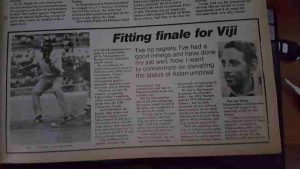
VIJI No: 1 in the World
High praise for Malaysian umpire.
G. VIJAYANATHAN of Malaysia is rated No: 1 hockey
umpire in the world. World Hockey, the official magazine of the International Hockey Federation, commenting on the umpiring at the Olympic Games in Munich, says: “The man generally recognised to be the best umpire was the young Malaysian, Vijayanathan.
“High praise indeed, considering that there were 29 international Grade One umpires from all over the world in the Olympic pool”.
2nd World Cup Amsterdam (August 24 to September 2, 1973)
The second World Cup was staged in the Amsterdam suburb of Amstelveen. I umpired the semi-final between Netherlands and Germany on August 31. What a coincidence it was with Malaysia celebrating Merdeka.
The match went to five periods of extra-time without either being able to score. For the first time in the crucial stages of a major competition, a penalty stroke competition was necessary. Holland won the penalty stroke competition 4 – 2 and qualified to meet India who downed Pakistan 1 – 0 in the second semi-final to avenge its defeat at the hands of the Pakistanis in the 1971 semi-finals. It was undoubtedly a memorable game and the cheers at the end could be described as a “lions roar.”
It was a pleasant surprise when I was told that the President (Rene Frank) had decided that the best umpires must officiate regardless of whether they were from Asia or Europe. That was how I got to be appointed to umpire the final together with Horacio.
It was a superb final with a wonderful and knowledgeable Dutch crowd. I had only one problem with the Dutchman Paul Litjens, known as one of the world’s best full backs. He had the habit of passing remarks at practically most of the decisions given against the Dutch even if it was on the opposite side of the field. After a severe warning, there was never a murmur from him after that.
However, India lost on penalty strokes and the Netherlands became hockey’s new World Champions. also rose to number one in the world rankings followed by India, Pakistan and West Germany.
As both Horatio and I walked back from across the field towards the main stadium after signing the match sheet, the entire crowd gave us a ‘standing ovation’ which I had never experienced before. It only went to prove how much the crowd enjoyed the game and appreciated our umpiring.
The 3rd World Cup, Kuala Lumpur(March 1 – 15, 1975)
Apart from being the organising secretary of the prestigious World Cup Hockey Tournament, I was included in the panel of umpires. There were 20 umpires in the panel and the other Malaysian umpire was none other than S. Kathiravale.
Great Honour: It was indeed a great honour for me to have been selected to umpire the final between India and Pakistan – two Asian giants on home ground in front of an estimated 50,000 spectators.
Much has been said and spoken until this day about the winning goal scored by Ashok Kumar of India. The Indians shrugged off a one-goal deficit at half time, turning on a dazzling attack particularly after Samiullah left the field (having hurt his collar bone) and finally won the game 2 – 1.
Islahuddin (captain of Pakistan team) has released a book – “DASH” written by him. In his book under a chapter “A Goal That Wasn’t”, he claims that the umpire had wrongly awarded the goal. Furthermore, Islahuddin has claimed he was the closest to the action and saw exactly what had happened.
In pictures of Ashok Kumar’s goal, one can clearly see nine players and myself, but Islahuddin is nowhere to be seen. Yet, he continues to make a false claim that he was closest to the action. Photographs and Videos do not lie.
Immediately after the match, a member of our organising committee, C. Thavanayagam saw a Pakistani official trying to hit down the pegs which were used to stop the goal boards (at the back of the goal posts) from moving. In actual fact the ball hit one of the pegs inside the goal and rebounded and did not hit the front upright as claimed by Islahuddin.
Moaning about Umpires;
I am sure every team and player around the world can relate to this point, A lot of players struggle with umpiring, but we often forget that the umpires’ decision is not something that one can control. Sometimes players blame umpires for one mistake which determine the game and players forget that they probably made several mistakes in the game which could have changed the game. Frustration with umpires is a mental battle and was something I had to learn how to control before I could reach higher levels in my own hockey career.
21st Olympics: Montreal, Canada, 1 976:
Raja Azlan Shah on returning from one of his overseas tours after attending an FIH meeting told me that I was selected to officiate at the Montreal Olympics. I umpired the semi-final between New Zealand and Netherlands which New Zealand won 2 – 1 and qualified to play Australia who had beaten Pakistan 2 – 1 in the other semi-final. Under the circumstances, I was hoping to get the opportunity to umpire the finals as no Asian country was involved.My dream and aspirations were shattered when A.I.S. Dara (who had a great influence with F.I.H.) insisted that the match between Pakistan and Netherlands for bronze medal must have an Asian umpire. He would have nobody else but me. The stadium was crammed to capacity for this match and Pakistan beat Netherlands 3 – 2 being tied 1 – 1 at half time.
1st Inter-Continental Cup – Rome.(September 22 to October 2 1977
The Inter-Continental Cup was staged for the first time in Rome marking an important land mark in the history of F. I. H.This tournament gave me the opportunity to officiate with some junior umpires who were officiating in a major tournament for the first time. All-in-all, I enjoyed my umpiring at the Inter-Continental Games, Rome
4th World Cup, Buenos Aires(March 18 to April 2, l978)
A total of 19 umpires were selected for this tournament. Only three umpires were from Asia – one each from India, Pakistan and Malaysia. At this World Cup, I umpired one of the semi-finals between Australia and the Netherland, which the later won 3 – 2.
Horatio Servetto (Argentina) was given the honour of umpiring the final in front of a home crowd together with Gillet of France.
The Champions Trophy – Super World Cup, Lahore, Pakistan(November 17 – 24, 1978)
The Pakistan Hockey Federation, aided by generous support from Pakistan International Airline (PIA) took responsibility for staging the first tournament in Lahore.
The final match: The final match would determine the first holder of the Champions Trophy. A draw would give Pakistan the title while Australia had to win. I had the honour of umpiring this game. Nearly 20,000 people watched this game, including President General Mohammad Zia-ul-Haq and several of the countries top personalities. The weather was splendid, and the match was telecast throughout the country. Pakistan beat Australia 2 – 1.
Honoured by the President of Pakistan – Gen. Zia-ul-Haq, 1979.
During the prize giving ceremony, General Zia-ul-Haq shook hands with me andcongratulated me and said, “You had umpired magnificently and I shall send you my personal present.”
That night, the President sent a carpet to my hotel and I took it as the personal gift that he had mentioned.
In March, 1979, the President sent through the Pakistan High Commissioner to Malaysia, Maj. Gen. Mohammad Rahim Khan a glittering gold medal with the emblem of the Pakistan Government. The gold medal also had the emblem of the Champions Trophy on one side and my name inscribed on the edge of the medal – which was the size of a fifty- cent coin.
Netherlands Hockey Association – 1979:
In 1979, the Netherlands Hockey Association organised a series of matches against Pakistan known as the “Peugeot Series.” Four World Class/Olympic umpires, namely Graham Nash (England), Santiago Deo (Spain), Alan Renaud (France) and I were selected and invited with the approval of F.I.H. We were housed in the best hotel, each occupying a single room. The Dutch hockey officials took us out every night to dine in some of the top restaurants.On a rough calculation considering the number of matches each umpire officiated, one minute my time umpiring would have cost about RM120/-. It certainly was an honour to have been selected to officiate.
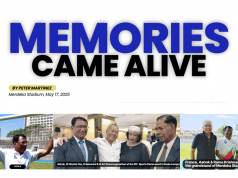

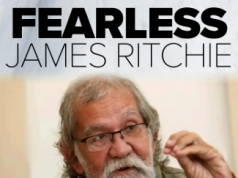
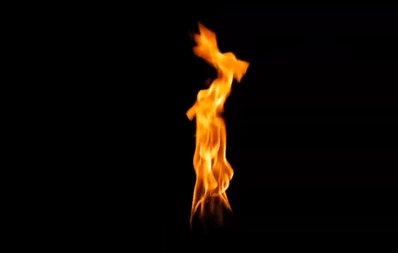 If you have an interesting personal story of a sports personality with photographs and video, we would like to publish it on this site.
If you have an interesting personal story of a sports personality with photographs and video, we would like to publish it on this site.


